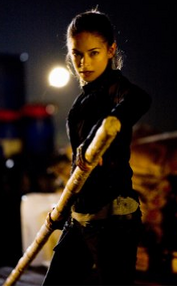 L.A. Times writer Jon Caramanica sort of got what he wanted last night during the 18th, season five episode of "The Office."
L.A. Times writer Jon Caramanica sort of got what he wanted last night during the 18th, season five episode of "The Office."NBC did not fire Steve Carell or dump his character Michael Scott from the sitcom, but the regional manager of the Scranton, Pa. branch of the Dunder Mifflin paper company quit his job in "New Boss," and online buzz indicates that someone "major" from the office might be coming with him "Jerry Maguire" style.
Anyone caught up with more recent episodes would bet their money on Jim Halpert (John Krasinki), whose teasing of Dwight Schrute (Rainn Wilson) landed him in trouble with the company's new vice president, Charles Miner (Idris Elba). He might just preempt his possible termination by quitting as well.
If someone is going to leave with Michael Scott, investing time in setting up Jim Halpert's demise might just be a clever way to deviate attention from the more obvious suspect, the primarily loyal Dwight Schrute. It was only one episode prior that Michael Scott's No. 3 was willing to be terminated to cover up his boss' golden ticket idea that could have lost Dunder Mifflin a lot of money.
 Someone else "major' on the Scranton office's payroll that might leave with Michael Scott is Pam Beesly (Jenna Fischer) because she has developed a painstakingly sympathetic brother-sister dynamic with her boss, not to mention that Jerry Maguire was joined in his own professional meltdown by a similar low-level office employee.
Someone else "major' on the Scranton office's payroll that might leave with Michael Scott is Pam Beesly (Jenna Fischer) because she has developed a painstakingly sympathetic brother-sister dynamic with her boss, not to mention that Jerry Maguire was joined in his own professional meltdown by a similar low-level office employee.A fair assumption to make is that Michael Scott has seen the 1996 film and might very well try to act out the famous "Who's coming with me?" scene before saying goodbye.
No one else from the usual cast of characters has developed as close of a relationship with Michael Scott to risk losing a steady job during a shaky economic time that has been acknowledged as also occurring in this fictional world.
 Something else to consider other than who might join the ranks of the unemployed with Michael Scott, if this comes to pass, is why the TV sitcom would bother to have him walk away from coworkers he values as a surrogate family. It might not simply be to spice things up during what might very well be the midpoint of the run of "The Office."
Something else to consider other than who might join the ranks of the unemployed with Michael Scott, if this comes to pass, is why the TV sitcom would bother to have him walk away from coworkers he values as a surrogate family. It might not simply be to spice things up during what might very well be the midpoint of the run of "The Office."
An important point to remember is that Charles Miner was initially set up as liking Michael Scott. Dunder Mifflin's new vice president genuinely seems to want to maintain a level of professionalism commensurate with performing the duties required of his job.
Easily forgotten is that David Wallace (Andy Buckley) is the bad guy in this situation because now that he no longer undervalues Michael Scott as a manager, he is trying to control someone whose effective leadership he cannot understand. Having Michael Scott gather information about the Prince Family Paper company alone speaks volumes about the chief financial officer's priorities.
 Maybe Michael Scott quits until Elba's Charles Miner, who is set to appear in only six episodes, exposes the skeletons in David Wallace's corporate closet.
Maybe Michael Scott quits until Elba's Charles Miner, who is set to appear in only six episodes, exposes the skeletons in David Wallace's corporate closet.
Whatever happens next week, "Two Weeks" is sure to make for entertainment riveting enough to include in the lineup for "Movie Mondays" in the Scranton, Pa. branch's conference room.
 Something else to consider other than who might join the ranks of the unemployed with Michael Scott, if this comes to pass, is why the TV sitcom would bother to have him walk away from coworkers he values as a surrogate family. It might not simply be to spice things up during what might very well be the midpoint of the run of "The Office."
Something else to consider other than who might join the ranks of the unemployed with Michael Scott, if this comes to pass, is why the TV sitcom would bother to have him walk away from coworkers he values as a surrogate family. It might not simply be to spice things up during what might very well be the midpoint of the run of "The Office."An important point to remember is that Charles Miner was initially set up as liking Michael Scott. Dunder Mifflin's new vice president genuinely seems to want to maintain a level of professionalism commensurate with performing the duties required of his job.
Easily forgotten is that David Wallace (Andy Buckley) is the bad guy in this situation because now that he no longer undervalues Michael Scott as a manager, he is trying to control someone whose effective leadership he cannot understand. Having Michael Scott gather information about the Prince Family Paper company alone speaks volumes about the chief financial officer's priorities.
 Maybe Michael Scott quits until Elba's Charles Miner, who is set to appear in only six episodes, exposes the skeletons in David Wallace's corporate closet.
Maybe Michael Scott quits until Elba's Charles Miner, who is set to appear in only six episodes, exposes the skeletons in David Wallace's corporate closet.Whatever happens next week, "Two Weeks" is sure to make for entertainment riveting enough to include in the lineup for "Movie Mondays" in the Scranton, Pa. branch's conference room.
Show more!



 Remember that Michael Scott has a penchant for
Remember that Michael Scott has a penchant for  And Dwight
And Dwight 

































